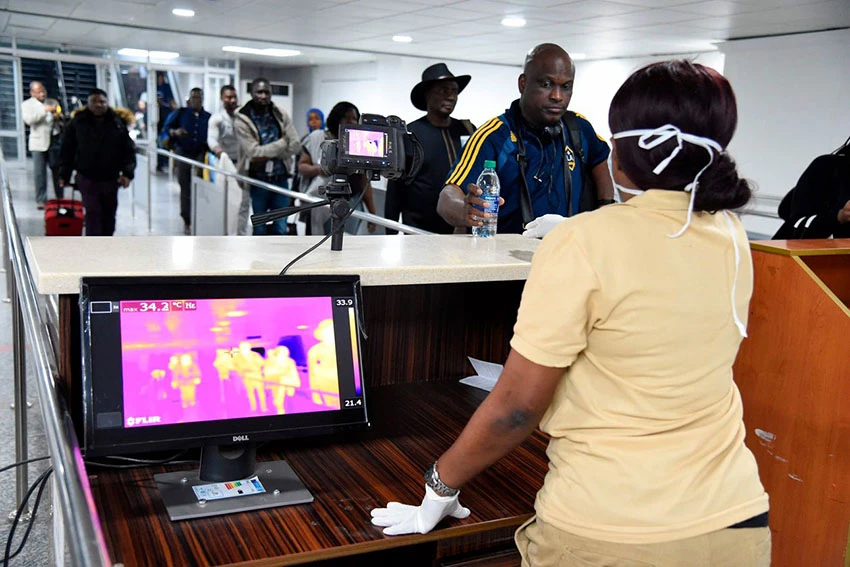
Nigeria’s health authorities on Friday reported the first confirmed case of the novel coronavirus in sub-Saharan Africa, adding to fears about its spread on a continent with some of the world’s weakest health-care systems.
Many African countries in recent weeks have moved to strengthen health defenses in preparation for the spread of the deadly virus. Several took action on Friday, as Kenya’s High Court ordered the suspension of flights from China and Uganda ordered more health workers and screening equipment to be deployed at all its border points.
An Italian citizen tested positive for the coronavirus on Thursday, two days after arriving in Nigeria’s commercial capital, Lagos, the health ministry said. He had flown from Milan, in a region that is grappling with the biggest outbreak of the coronavirus outside Asia.
The individual has been quarantined in a specialized unit and the authorities were retracing his movements, said Health Minister Osagie Ehanire.
“The patient is clinically stable, with no serious symptoms and is being managed at the Infectious Diseases Hospital,” Dr. Ehanire said. “All Nigerians should take care of their health and maintain hand and respiratory hygiene.”
Nigeria, with a population of 190 million people, is Africa’s most populous nation and Lagos, with an estimated 21 million residents, is the continent’s largest city. The lack of prior cases in the region puzzled health specialists given its close ties with China.
Tests conducted on suspected cases in Kenya, Ethiopia, Ivory Coast and Botswana have been negative, local health authorities said. The World Health Organization has warned that Africa’s “fragile health systems” could prevent nations from responding.
In North Africa, two cases have been confirmed, in Egypt and Algeria.
Nigerian officials said Friday that the coronavirus patient traveled from Italy via Istanbul, before arriving in Lagos on Feb. 24. He entered undetected and continued to his place of work in Ogun state, the next day, where he received treatment at a local medical facility.
The information raised fears that the patient might have come into contact with many people before being isolated.
“Detection of cases in Africa is going to be challenging for several compounding reasons,” said Trudie Lang, from Oxford University’s Nuffield Department of Medicine. “The most pressing need is for inexpensive testing kits to be made available across the globe so diagnosis can be done on the spot in every setting.”
The outbreak has killed more than 2,800 people and spread to at least 46 countries since it was first detected in the Chinese city of Wuhan late last year. It has now spread to every continent, except Antarctica.
China is Africa’s largest trading partner and bilateral relations have expanded dramatically in recent years as resource-hungry Beijing has become the top consumer of the continent’s vast mineral resources. But since the outbreak, many countries have sought to limit flights. Countries including the Democratic Republic of Congo and Mozambique have prevented their citizens from traveling to China, while Zambia and Kenya have raised travel alerts. South Africa said Thursday that it would evacuate at least 132 of its citizens from Wuhan.
“With the first case of #COVID19 in sub-Saharan Africa confirmed in Nigeria, the virus is no longer a threat but a reality in the region,” Dr. Matshidiso Moeti, the head of WHO in Africa, said in a tweet.
Some experts said that Nigeria’s expertise in fighting infectious diseases places the West African nation in a better position.
Amid the world’s worst Ebola outbreak, in West Africa five years ago, Nigeria was able to limit the impact to fewer than a dozen deaths in a region where the deadly virus killed over 13,000 people.
Lower levels of urbanization and warmer temperatures may act as a buffer against the rapid spread of the new coronavirus in Africa.
“Sub-Saharan Africa will be less affected health-wise on a per capita basis than most other regions,” the Economist Intelligence Unit said. “But the economic damage may still be substantial, in terms of supply-chain disruption and lower commodity prices.”
Nigerian authorities on Friday called for calm and said they had been strengthening control measures such as screening, and surveillance to ensure that any outbreak is controlled and contained quickly.
“People with a persistent cough or sneezing should stay home or keep a social distance,” Dr. Ehanire said.
Many countries in the region, including Mozambique, Malawi and Chad, which have close economic and diplomatic ties with China and sizable Chinese and European expatriate communities, still lack the capacity to test the virus.
The first known African person to be infected, a 21-year-old Cameroonian in the Chinese city of Jingzhou, recovered.
The virus is suspected of having originated at a wildlife-food market in Wuhan. One hypothesis is that the intermediary animal for the virus may be a pangolin, a small mammal prized for its meat and scales covering its body.
Containing the virus in a region where millions of people still consume wildlife as part of their diet may be challenging, officials said.
San Francisco-based environmental group WildAid said this week that Nigeria has become a regional hub for illegal exports of pangolin scales to East Asia, raising risks. Many countries in West and Central Africa are a particular risk, WildAid said, urging them to close down wildlife markets.
“The coronavirus outbreak highlights the massive risk of wildlife markets and consumption,” said WildAid Africa Program Director Lindlyn Moma. “While some communities in Africa might consume wildlife as part of their diet, commercializing the trade, mixing species together and bringing live animals into densely populated urban areas greatly increases the risk of a pandemic.”




















